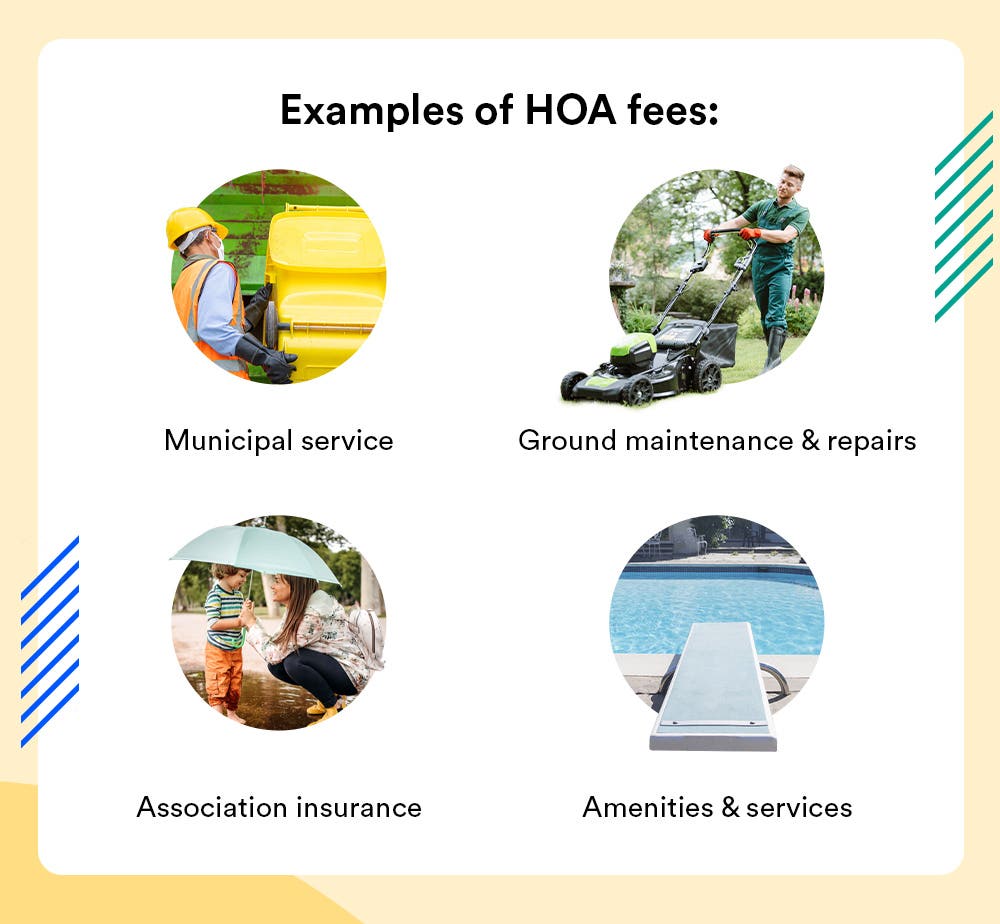HOA fees: Everything you need to know

Homeownership is part of the classic American dream — 74 percent of Americans agree, according to a recent Bankrate Financial Security survey. And homeowners who live in communities governed by homeowners associations can usually take advantage of HOA-provided perks, which can include everything from landscaping and lawn care to swimming pools and sports facilities. How much the HOA oversees can depend on the community type: It may be responsible only for maintaining common areas, such as high-rise lobbies and hallways, or it may cover much, much more.
As an HOA member, you’ll be responsible for paying HOA fees, which cover the cost of these services. The fees vary widely depending on the level of amenities in the community, and they can be impacted by outside influences, such as the economy or the community’s geographic location. Here’s everything you need to know before purchasing a home in an HOA community.
HOA fee statistics
- Monthly HOA fees average $170, according to the U.S. Census Bureau’s American Housing Survey estimates. The majority of homeowners in HOAs, though, pay less than $50 a month.
- 74.2 million Americans, or 29 percent of the country’s population, lived in homeowners associations, condominium communities or co-ops as of 2021, according to the Community Associations Institute (CAI).
- Homes in associations have a collective value of $11 trillion, according to CAI data.
- California has the highest number of associations at more than 50,000, per the CAI, closely followed by Florida at 49,420.
What is a homeowners association?
A homeowners association, or HOA, is an organization within a community that sets and enforces rules for properties in its jurisdiction. These can include anything from what colors you can paint your house to how many pets you may have, and what kind.
Whether you live in a single-family home, condominium or townhouse, if your community has shared spaces or amenities like a swimming pool, tennis court or security gates, those common areas are likely maintained by an HOA or condo association. The HOA is usually run by a board consisting of property owners who are elected by other property owners in the community. HOA fees cover the costs of these services.
HOA benefits
- You’ll have access to valuable amenities, such as a fitness center, playground or pool.
- Maintenance tasks that can be a hassle, like mowing the lawn and clearing snow, are taken care of for you.
- Guidelines around home upkeep and grooming tend to keep the neighborhood looking good and the property values consistent.
HOA drawbacks
- You have to pay HOA fees to cover the cost of all those benefits. These vary widely by community and can range from just $100 a year to more than $1,000 per month, according to the American National Bank of Texas.
- HOAs impose many restrictions and rules, which may impact how you can use your home. For example, home-based businesses and renters are often forbidden.
- If you fail to pay your dues on time, you could risk foreclosure (depending on your state’s laws).
Lenders evaluating your debt ratio will look at your expected housing payments, including mortgage principal, interest, property taxes, property insurance and HOA fees. The total cost of homeownership, not just monthly principal and interest payments, is what counts in determining what you can afford.— Greg McBride, Bankrate Chief Financial Analyst
What is an HOA fee?
An HOA fee is a regular fee (usually monthly or quarterly) assessed by the homeowners association to pay for the services it provides. If you live in a condo, you may pay a similar fee to the condo association.
If you plan to buy a home in an HOA, it’s important to understand how HOA fees work. The HOA typically uses the money it collects to help maintain or improve the quality of life in the community. These fees are paid on top of your mortgage, property tax and homeowners insurance payments. Even if your mortgage is paid off, you’ll still have to continue paying HOA fees.
“The fees and dues collected and managed by a homeowners’ association can provide a resident with quality-of-life comforts that an individual owner might not be able to enjoy on their own,” says Candy La Monica, broker of the Candy La Monica Team with RE/MAX Executive in North Carolina. “If you feel that these are important benefits, you won’t mind paying the fees or dues. Just be sure to have your real estate agent help you do the proper due diligence before you buy. If these services and amenities are not important to you, you might be happier living in an area outside of an HOA.”
What do HOA fees cover?
The things HOA fees pay for can vary widely and depend on the amenities available in your community. Your HOA’s governing documents should outline what fees cover specifically — some common examples include grounds maintenance and landscaping, snow and trash removal and electricity and pest control for common areas.

HOA dues can also pay for enforcement of HOA rules. In general, these rules aim to make sure each home is visually appealing and in good repair, which can help maintain property values and ensure that the community remains safe for all residents to enjoy.
Keep in mind: The more services your HOA provides, the higher your HOA dues will be.
How much are HOA fees?
Nationally, the average monthly HOA fee is $170, according to Census data. HOA fees vary widely depending on the property location and the amenities available to property owners. The board that runs the HOA decides how much to charge property owners to cover the community’s expenses.
For example, the owner of an oceanfront condo that’s loaded with amenities might pay $1,000 a month in HOA fees, while someone in a modest gated community 10 miles inland might pay only $150 a month.
Larger residences in an HOA sometimes pay more than smaller ones, on the assumption that they use more services. For example, it costs more to cut the grass at a large, single-family home than at a narrow townhouse.
Special assessment fees
While regular HOA fees tend to stay consistent, the community’s board can also authorize what’s known as a special assessment. These are usually put in place to cover the cost of major or unanticipated work, like repairing damage to common areas after a natural disaster or refinishing a building’s facade (which some cities, like New York, require periodically).
Special assessments can also be used to help build up the community’s reserve fund, which is essentially the HOA’s rainy day account. That money can wait in the wings to help mitigate much larger special assessments in the event of major required work.
Assessments can be one-time charges or ongoing fees on top of your regular dues. HOA boards usually have a lot of freedom to institute assessments, and don’t necessarily have to poll, or even notify, residents before they do. (Though, of course, passing a resolution and notifying the community is a better practice.)
Inflation and HOA fees
Your HOA fees cover the cost of goods and services, which can be heavily impacted by inflation. For example, if the pool maintenance company your HOA uses raises their prices, because the cost of the materials they need has increased due to inflation, your fees might be raised in tandem to cover the additional cost. Any inflationary increase in the costs an HOA must cover is likely to be passed on to the homeowners in the form of higher fees.
Key inflation statistics and the impact on HOA fees
- The annual inflation rate as of August 2023 is 3.7 percent, according to the U.S. Bureau of Labor Statistics’ Consumer Price Index.
- Industry website HOA Management predicts that community associations will have to raise dues by 10 to 15 percent by the end of 2023 to keep up with inflation.
- According to Bankrate’s American-dream survey, 53 percent of Americans do not currently own a home due to poor housing market conditions, including high prices and high mortgage rates.
- Housing is one of the most significant contributors to inflation overall — the shelter index has increased 7.3 percent over the past 12 months.
- Rising insurance premiums are also pushing up the cost of HOA fees. One Florida condo association’s property insurance shot up nearly 1,000 percent this summer, according to the Tampa NBC affiliate.
HOA fees and location
Location plays a large factor in the price of HOA fees — they can vary a lot depending on local laws and how expensive an area’s cost of living is. For example, Tampa Bay, Florida’s ABC affiliate reports that high-rise condo owners are feeling the squeeze due to a new law that requires milestone inspections and mandates that HOA associations have enough reserves to make any necessary repairs.
Another Florida city, Miami, had the highest inflation rate of any metro area in the country in 2022, according to data from the Bureau of Labor Statistics. Phoenix, Seattle, Atlanta and Philadelphia rounded out the top five, followed by New York, Baltimore, Detroit, St. Louis and Chicago. HOA fees in these areas will likely rise, if they haven’t already, as a result of the high inflation.
| Sources: Axios, U.S. Bureau of Labor Statistics | |
| Miami | 9.9% |
| Phoenix | 9.5% |
| Seattle | 8.4% |
| Atlanta | 8.1% |
| Philadelphia | 6.4% |
Are HOA fees tax-deductible?
IRS regulations can be complicated, but in general, HOA fees are not deductible if the property you own in the community is your primary residence. However, if you rent it out, your HOA dues may be deductible as a rental expense. HOA special assessments are not deductible.
What happens if you can’t pay your HOA fees?
If you’re struggling to pay your HOA dues, the board or management company may be able to put you on a payment plan. You should try to be upfront about your financial situation with the board early on to see if you can reach an accommodation.
Ultimately, if you’re in arrears for too long or your debt is insurmountable, the HOA has the power to have you evicted. A lien could also be placed against your deed to help the community recoup its losses.
Questions to ask before you buy in an HOA
If you’re considering buying a property in a homeowners association, the amount and nature of the HOA fees should be readily available. Often, it’s included in the real estate listing. You should also be able to access, through your real estate agent or the HOA, minutes of past board meetings and other records that show fee changes and any rules that relate to fees.
Double-check the HOA rules — often called CC&Rs for “covenants, conditions and restrictions” — to make sure you understand how they might impact you. As you learn more about the HOA, look for answers to the following questions:
- How often has the HOA increased fees in recent years?
- What services do these fees cover? What don’t they cover?
- Does the HOA have a reserve fund for long-term repairs and maintenance? If so, how much is in it?
- Has the HOA hired an expert to conduct a reserve study that estimates how much money should be saved to cover these expenses?
- Does the HOA have a history of charging special assessments? If so, how much were they, what were they for and how often did they occur?
Getting answers to these questions may lead you to conclude that the HOA doesn’t have enough cash on hand for significant expenses, which likely means that either HOA fees will go up or special assessments will be charged. Alternatively, the answers may give you confidence that the HOA has planned well for the future and has enough money for future costs to avoid high unexpected assessments.
As you assess the short- and long-term costs of buying a home, learning about HOA fees can help you make a more informed decision. You might discover that a property that otherwise looks affordable is actually out of reach, or you might conclude that it’s a perfect fit for your finances.
Bottom line
Before you buy a home in a HOA community, it’s important to evaluate the costs versus the benefits. HOA fees can vary widely depending on a variety of factors, including your location, the level of amenities provided and even inflation. Areas with a higher cost of living and those with a higher risk of extreme weather are likely to have higher fees. While these fees may seem like a luxury expense or just a big dent in your monthly budget, the convenience can be worth it — and they can save you a huge amount of hassle on tasks like snow removal and lawn maintenance.
Why we ask for feedback Your feedback helps us improve our content and services. It takes less than a minute to complete.
Your responses are anonymous and will only be used for improving our website.
You may also like

Cost to buy a house in Virginia

Buying a foreclosed home: A step-by-step guide

What is HOA insurance and what does it cover?

What is an HOA, and how do they work?


